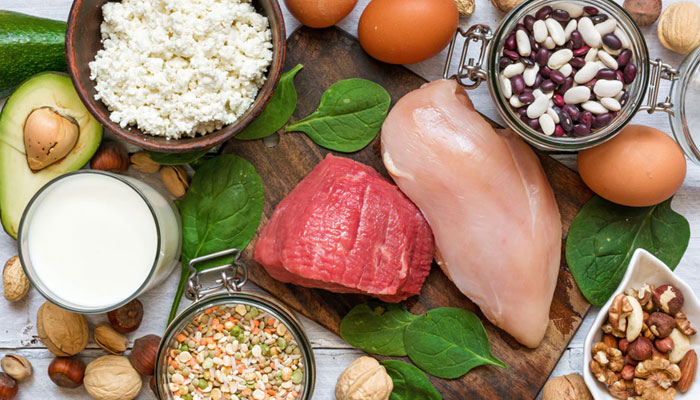
Protein is an essential part of a healthy diet and can be found in a variety of foods. However, not all proteins are created equal. In this article, we will discuss the top essential proteins that you need for a healthy diet. From lean meats to plant-based options, we’ll cover everything you need to know to ensure you’re getting the right amount of protein in your diet.
Lean Meat
Protein is a major building block of muscles, skin, hair, and blood. It also helps form hormones and enzymes and is used for energy by some cells. While the body can make some of its own amino acids, it needs to eat protein from food sources such as meats, fish, poultry, dairy products, beans, legumes, and nuts to get the essential amino acids it cannot make on its own.
The best choice is lean meats. This includes chicken, turkey, and white meat cuts like breasts and wings, as well as pork tenderloin. Fish and shellfish are also healthy choices. They provide a variety of nutrients including iron, vitamin A, and omega-3 fats. Choosing seafood such as tuna or salmon over red meat can help reduce a person’s overall saturated fat intake and increase the amount of heart-healthy unsaturated fats in their diet.
Aim to eat about five servings of protein per day based on their age, weight, gender, and activity level. One ounce of protein is equal to about a cup of cooked beans, an egg, or half a cup of yogurt.
When selecting meat, choose options that are low in saturated fat and sodium. Fatty or processed meats such as hot dogs, sausage, bacon, and deli meats contain saturated fat and sodium, which can raise cholesterol levels and lead to heart disease and other health problems. Instead, opt for lean meats such as skinless chicken breasts or beef sirloin, which are lower in saturated fat than other cuts of meat. Using the broiling or baking method to prepare meat can also help reduce saturated fat. Opting for grass-fed meats can be even healthier as they typically have more beneficial fat profiles. Don’t forget to explore Food & Drinks Coupon Codes for potential discounts when purchasing healthier meat options.
Eggs
Eggs are a classic breakfast option, but they go well in many dishes throughout the day, including sandwiches, soups, salads, and casseroles. One large egg packs in 6 grams of protein and carries all nine “essential” amino acids, which are the ones your body can’t make on its own. Eggs are also a good source of choline, which is used to create cell membranes and important neurotransmitters in the brain. Choline has also been linked to healthy liver function and a reduction in the risk of fatty liver disease.
Egg yolks are rich in fat-soluble vitamins, such as vitamin A and vitamin D, as well as the antioxidants lutein and zeaxanthin, which help prevent macular degeneration. Eating two eggs a day has been shown to improve levels of HDL cholesterol, the “good” type that reduces your risk for heart disease and stroke.
A high-protein diet is important for weight loss, as it increases satiety, which can reduce the urge to overeat. Additionally, egg whites contain a protein called ovomucin, which helps prevent blood clots and binds metal ions, and egg yolks are rich in the antiviral proteins lysozyme and lipovitellin.
If you’re a vegan or a vegetarian, try soy foods, such as tofu, tempeh, and soybeans. Soy protein is considered a complete protein because it provides all nine essential amino acids, and is high in fiber and the B vitamins magnesium, iron, folate, zinc, and isoflavones. Soy is also an excellent source of omega-3 fatty acids and soluble fiber. Try incorporating soy products into your diet by eating a serving of edamame (steamed immature soybeans in pods) or adding tofu and other soybean-based foods to stir-fries, salads, casseroles, and other recipes.
Nuts
Nuts are high-energy foods that are rich in protein, dietary fiber, and many nutrients, including unsaturated fats, vitamin E, folic acid, vitamin B6, magnesium, potassium, and zinc. They are also a great source of niacin. Eating nuts four or more times per week has been shown to reduce cholesterol levels and improve triglyceride levels, thus decreasing your risk for heart disease.
Epidemiologic studies have linked nut intake to reduced rates of coronary heart disease in both men and women. Clinical trials have reported similar findings with nut consumption lowering serum cholesterol and triglyceride concentrations, as well as improving vascular reactivity, an important factor in reducing the risk of ischemic events.
Nut consumption is also associated with lower blood pressure, visceral adiposity, and metabolic syndrome. In addition, nut-enriched diets have been associated with reduced inflammation in the body.
Despite their high-fat content, nuts are not associated with an increase in weight and have been found to promote healthy weight loss. In fact, they may actually enhance the weight loss and abdominal fat loss of those following a low-carbohydrate diet. This is thought to be due to the satiety effect of nuts, the fact that they are rich in fiber, and their unique fatty acid composition which limits the amount of fatty acids that are digested. Many studies have also shown that consuming nuts reduces oxidative stress markers in the blood and increases levels of the anti-inflammatory adipokine adiponectin. In short, incorporating nuts and seeds into your diet regularly is an essential part of a healthy eating pattern. In fact, a handful (approximately 3 to 7 grams) of nuts provides you with a good source of protein, folic acid, potassium, and vitamin E.
Dairy
The dairy food group is packed with protein, calcium, and other nutrients. Current dietary recommendations suggest you eat three servings of dairy foods per day, but the amount of dairy you choose may vary depending on your tolerance to dairy. There’s a lot of fear-mongering about dairy online, Thomason says, but you shouldn’t avoid it if you can tolerate it.
Milk and dairy foods are rich in protein and fat, two filling nutrients that help you feel full throughout the day. They are also good sources of vitamin D, which is important for bone health and immune function.
Dairy foods offer many delicious options. You can enjoy them on your own, pair them with fruits and vegetables, or use them in soups, sauces, dips, and baked goods. Some dairy options like yogurt and kefir are probiotic, which means they contain good bacteria that can boost gut health. If you can’t tolerate lactose, the sugar found in dairy, there are lower-lactose options available. Several brands of milk, including a2 Milk and Fairlife, have added lactase enzymes to help break down lactose in the body, while soymilk, oat milk, coconut milk, and hemp “milk” are lactose-free. Don’t forget to explore Valley Food Storage Discount Codes for potential savings when purchasing dairy and lactose-free products.
Dairy products are a great source of calcium, which plays an important role in bone health and can help reduce the risk of osteoporosis. In addition, drinking milk and getting enough protein can help slow age-related muscle loss, also called sarcopenia. The nutrient composition of dairy foods can vary, so make sure to check the nutrition label and select lower-saturated fat and less sugar options. The dairy food group also includes unsweetened, calcium-fortified soy milk, yogurts, and cheeses. If you can’t eat dairy, try to get enough calcium from other sources (like leafy greens, nuts, and beans) in your diet.
Vegetables
Vegetables are high in a variety of nutrients including fiber, vitamins, and minerals. They are also low in calories and offer a filling and satisfying alternative to meats or carbohydrates. Eating a wide variety of vegetables helps ensure adequate nutrient intake and may help reduce the risk of some diseases.
Unlike animal products, which contain complete proteins, most plant-based foods lack one or more essential amino acids. However, many plant-based foods are excellent sources of protein if eaten in combination with other food sources that provide the missing amino acids. For example, rice and beans or peanut butter on whole wheat bread are good combinations.
While it’s tempting to rely on meat as a source of protein, it is important to include a variety of proteins in your diet, especially a variety of vegetables. Whether steamed, roasted, tossed in salads, or added to soups and stews, vegetables are a delicious way to add protein and other nutrients to your diet.
In addition to providing protein, vegetables are a rich source of fiber. Studies suggest that a diet high in dietary fiber can help lower cholesterol, improve blood sugar control, and reduce the risk of heart disease, cancer, and obesity.
We’ve all heard our mothers urging us to “Eat your vegetables!” and for good reason. Vegetables are packed with healthy vitamins, minerals, and health-promoting substances known as phytochemicals that can lower your risk of heart disease, diabetes, hypertension, and some cancers. Plus, a cup of most vegetables contains only about 35 calories. The USDA recommends aiming for five servings of vegetables a day. That includes vegetables that are in season and those available all year at SavingGain.
Conclusion
Consuming adequate amounts of protein in your diet is essential for maintaining overall health and wellness. Incorporating a variety of protein sources, such as lean meats, fish, nuts, and legumes, can provide your body with the necessary amino acids it needs to function properly. By making protein a priority in your meals, you can optimize your health and achieve your fitness goals.








